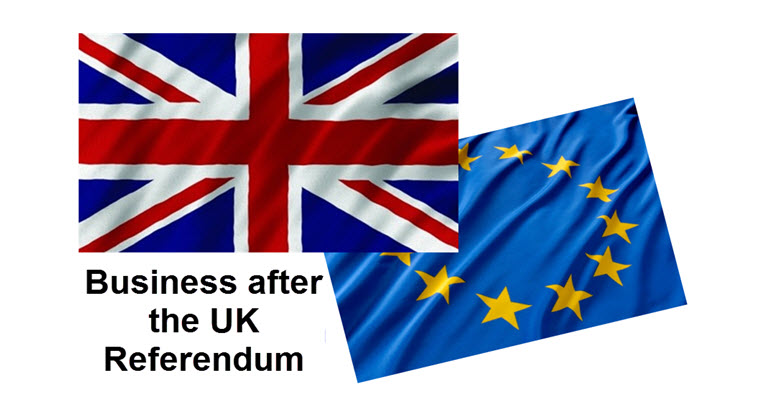The country has voted, and whether a Remain or Leave supporter, all businesses in the promotional merchandise industry now find themselves watching and waiting as we navigate unchartered waters. Sourcing City are interested in hearing views from distributor and supplier businesses across the country. So, to kick things off, here is a personal view on how the referendum played out.
In a nutshell, the UK electorate were put in an extremely difficult position when prime minister David Cameron called the EU Referendum purely on a political basis to win the last election.
Prior to the referendum, David Cameron promised to negotiate a favourable deal with the EU. What actually happened was that the EU appeared to not seriously believe that the UK would leave and refused to move from their set path. Cameron therefore came back with very little change to offer the UK electorate, and although it was not widely recognised at the time, the die was cast.
Two options then had to be considered by referendum voters:
- Remain, which meant staying in the tariff free EU single market for trade. To do so also meant accepting free movement of people across the EU. This had benefits for UK citizens wishing to work, study or live abroad, but it also meant no control on the numbers of EU citizens entering the UK borders. Remaining also meant accepting the EU plans for a future European Federal Superstate, more EU law powers, potential tax controls, a potential European army and an increase in EU country memberships. It was argued that the UK had veto’s in place, but it was never made clear if and how these may have been used. The Remain camp and financial experts warned of significant negative economic consequences should a leave result prevail. Both the Remain & Leave sides generally agreed that the EU required reform and the Remain campaign argued that change could only take place if we remained ‘In’ to apply influence.
- Leave, which meant the UK Parliament regaining sovereignty in UK law making. Arguments were made that the EU was fundamentally undemocratic and controlled by bureaucrats un-elected by the UK. The UK is pro-immigration, but UK health services and housing were claimed to be under pressure from population growth. Leaving the EU meant that the UK could control the numbers of people entering the country from the EU on a skills basis. Voting Leave would also mean leaving the EU single market with its valuable free trade barriers. As the UK is a significant net importer from the EU, the Leave campaign argued that acceptable EU trade deals could again be negotiated and EU restrictions on creating trade deals with other world countries would be lifted. The Leave campaign argued that we had insufficient influence to obtain EU reform and we had a track record of being out-voted.
It was disappointing to see that both campaigns manipulated ‘facts’ and used ‘project fear’ in delivering their arguments, rather than focusing on the positives of where either of the campaigns could take us.
A significant majority of UK large business leaders appeared in favour of staying in the EU, small business leaders appeared to have more of a mixed view, and most of the population expected the UK to vote to ‘Remain’. A clear level of shock set in when the result came back that the UK had voted to Leave. As a result, there was an immediate negative reaction on the stock and money markets worldwide. UK political turmoil has also set in with the prime minister’s resignation, and the opposition parliamentary Labour party choosing to now try to remove their leader in preparation of a likely general election in the medium term. So basically, not every MP in parliament is currently focused on the future of the UK after Brexit!
There is little doubt that UK companies are apprehensive as to where everything will lead, and it is likely instability will reign until a lot of things become clearer. At the same time companies will be weighing up the risks and opportunities. In the short term UK exporters may benefit from the weak pound, whilst importers battle with the currency fluctuation. The UK economy is on a much better footing than when the 2008 international economic crash occurred, our banks are stronger, and the Bank of England say they are ready and prepared to provide support where required. If our banks make funds available to business, and businesses have the confidence to invest for growth, then the economy can continue to be driven forward.
The truth is no one knows what will happen in the short term, but all it will take to stabilise and return confidence to the UK economy are indications that we can continue trade with the EU tariff free after exit. New international trade deals by the UK would also boost the situation. Should the EU decide to play hardball with the UK as a warning to any other potential dissenters, then economic uncertainty will prevail until the UK finds its own positive route.
To add to this, the EU also now has significant questions to ask itself following the Leave vote. Do they stick to their current unwavering path towards a European Superstate with the ever failing Euro currency, or reform and look to bring the UK back into the fold for the benefit of all in Europe?
To contribute and read other views please click here.
Published on: July 4th, 2016





